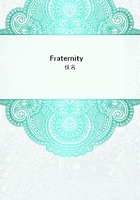
第17章
Hilary's tall thin figure appearing in the open doorway of the top-floor front, his kind and worried face, and the pale agate eyes of the little bulldog peeping through his legs, were witnessed by nothing but a baby, who was sitting in a wooden box in the centre of the room. This baby, who was very like a piece of putty to which Nature had by some accident fitted two movable black eyes, was clothed in a woman's knitted undervest, spreading beyond his feet and hands, so that nothing but his head was visible. This vest divided him from the wooden shavings on which he sat, and, since he had not yet attained the art of rising to his feet, the box divided him from contacts of all other kinds. As completely isolated from his kingdom as a Czar of all the Russias, he was doing nothing. In this realm there was a dingy bed, two chairs, and a washstand, with one lame leg, supported by an aged footstool. Clothes and garments were hanging on nails, pans lay about the hearth, a sewing-machine stood on a bare deal table. Over the bed was hung an oleograph, from a Christmas supplement, of the birth of Jesus, and above it a bayonet, under which was printed in an illiterate hand on a rough scroll of paper: "Gave three of em what for at Elandslaagte. S. Hughs." Some photographs adorned the walls, and two drooping ferns stood on the window-ledge. The room withal had a sort of desperate tidiness; in a large cupboard, slightly open, could be seen stowed all that must not see the light of day. The window of the baby's kingdom was tightly closed; the scent was the scent of walls and washing and red herrings, and--of other things.
Hilary looked at the baby, and the baby looked at him. The eyes of that tiny scrap of grey humanity seemed saying:
'You are not my mother, I believe?'
He stooped down and touched its cheek. The baby blinked its black eyes once.
'No,' it seemed, to say again, 'you are not my mother.'
A lump rose in Hilary's throat; he turned and went downstairs.
Pausing outside the little model's door, he knocked, and, receiving no answer, turned the handle. The little square room was empty; it was neat and clean enough, with a pink-flowered paper of comparatively modern date. Through its open window could be seen a pear-tree in full bloom. Hilary shut the door again with care, ashamed of having opened it.
On the half-landing, staring up at him with black eyes like the baby's, was a man of medium height and active build, whose short face, with broad cheekbones, cropped dark hair, straight nose, and little black moustache, was burnt a dark dun colour. He was dressed in the uniform of those who sweep the streets--a loose blue blouse, and trousers tucked into boots reaching half-way up his calves; he held a peaked cap in his hand.
After some seconds of mutual admiration, Hilary said:
"Mr. Hughs, I believe?" Yes.
"I've been up to see your wife."
"Have you?"
"You know me, I suppose?"
"Yes, I know you."
"Unfortunately, there's only your baby at home."Hughs motioned with his cap towards the little model's room. "Ithought perhaps you'd been to see her," he said. His black eyes smouldered; there was more than class resentment in the expression of his face.
Flushing slightly and giving him a keen look, Hilary passed down the stairs without replying. But Miranda had not followed. She stood, with one paw delicately held up above the topmost step.
'I don't know this man,' she seemed to say, 'and I don't like his looks.'
Hughs grinned. "I never hurt a dumb animal," he said; "come on, tykie!"Stimulated by a word she had never thought to hear, Miranda descended rapidly.
'He meant that for impudence,' thought Hilary as he walked away.
"Westminister, sir? Oh dear!"
A skinny trembling hand was offering him a greenish newspaper.
"Terrible cold wind for the time o' year!"
A very aged man in black-rimmed spectacles, with a distended nose and long upper lip and chin, was tentatively fumbling out change for sixpence.
"I seem to know your face," said Hilary.
"Oh dear, yes. You deals with this 'ere shop--the tobacco department. I've often seen you when you've a-been agoin' in.
Sometimes you has the Pell Mell off o' this man here." He jerked his head a trifle to the left, where a younger man was standing armed with a sheaf of whiter papers. In that gesture were years of envy, heart-burning, and sense of wrong. 'That's my paper,' it seemed to say, 'by all the rights of man; and that low-class fellow sellin' it, takin' away my profits!'
"I sells this 'ere Westminister. I reads it on Sundays--it's a gentleman's paper, 'igh-class paper--notwithstandin' of its politics.